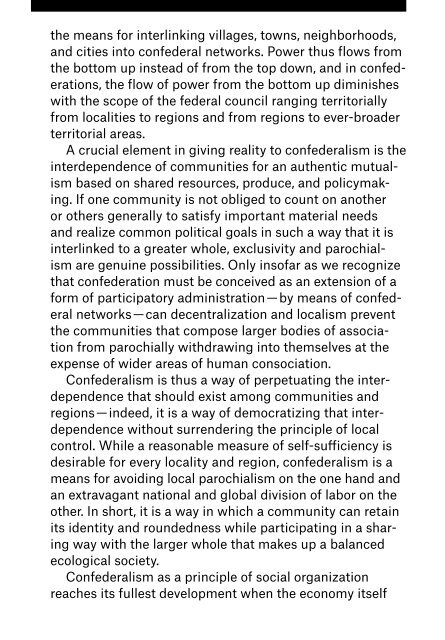Stateless Democracy
1RHiH4Y
1RHiH4Y
Create successful ePaper yourself
Turn your PDF publications into a flip-book with our unique Google optimized e-Paper software.
the means for interlinking villages, towns, neighborhoods,<br />
and cities into confederal networks. Power thus flows from<br />
the bottom up instead of from the top down, and in confederations,<br />
the flow of power from the bottom up diminishes<br />
with the scope of the federal council ranging territorially<br />
from localities to regions and from regions to ever-broader<br />
territorial areas.<br />
A crucial element in giving reality to confederalism is the<br />
interdependence of communities for an authentic mutualism<br />
based on shared resources, produce, and policymaking.<br />
If one community is not obliged to count on another<br />
or others generally to satisfy important material needs<br />
and realize common political goals in such a way that it is<br />
interlinked to a greater whole, exclusivity and parochialism<br />
are genuine possibilities. Only insofar as we recognize<br />
that confederation must be conceived as an extension of a<br />
form of participatory administration — by means of confederal<br />
networks — can decentralization and localism prevent<br />
the communities that compose larger bodies of association<br />
from parochially withdrawing into themselves at the<br />
expense of wider areas of human consociation.<br />
Confederalism is thus a way of perpetuating the interdependence<br />
that should exist among communities and<br />
regions — indeed, it is a way of democratizing that interdependence<br />
without surrendering the principle of local<br />
control. While a reasonable measure of self-sufficiency is<br />
desirable for every locality and region, confederalism is a<br />
means for avoiding local parochialism on the one hand and<br />
an extravagant national and global division of labor on the<br />
other. In short, it is a way in which a community can retain<br />
its identity and roundedness while participating in a sharing<br />
way with the larger whole that makes up a balanced<br />
ecological society.<br />
Confederalism as a principle of social organization<br />
reaches its fullest development when the economy itself<br />
is confederalized by placing local farms, factories, and<br />
other needed enterprises in local municipal hands — that<br />
is, when a community, however large or small, begins to<br />
manage its own economic resources in an interlinked network<br />
with other communities. To force a choice between<br />
either self-sufficiency on the one hand or a market system<br />
of exchange on the other is a simplistic and unnecessary<br />
dichotomy. I would like to think that a confederal ecological<br />
society would be a sharing one, one based on the pleasure<br />
that is felt in distributing among communities according<br />
to their needs, not one in which “cooperative” capitalistic<br />
communities mire themselves in the quid pro quo of exchange<br />
relationships.<br />
Impossible? Unless we are to believe that nationalized<br />
property (which reinforces the political power of the<br />
centralized state with economic power) or a private market<br />
economy (whose law of “grow or die” threatens to undermine<br />
the ecological stability of the entire planet) is more<br />
workable, I fail to see what viable altemative we have to the<br />
confederated municipalization of the economy. At any rate,<br />
for once it will no longer be privileged state bureaucrats<br />
or grasping bourgeois entrepreneurs — or even “collective”<br />
capitalists in so-called workers-controlled enterprises — all<br />
with their special to promote who are faced with a community’s<br />
problems, but citizens, irrespective of their occupations<br />
or workplaces. For once, it will be necessary to transcend<br />
the traditional special interests of work, workplace,<br />
status, and property relations, and create a general interest<br />
based on shared community problems.<br />
Confederation is thus the ensemble of decentralization,<br />
localism, self-sufficiency, interdependence — and more.<br />
This more is the indispensable moral education and character<br />
building — what the Greeks called paideia — that makes<br />
for rational active citizenship in a participatory democracy,<br />
unlike the passive constituents and consumers that we<br />
122–123



